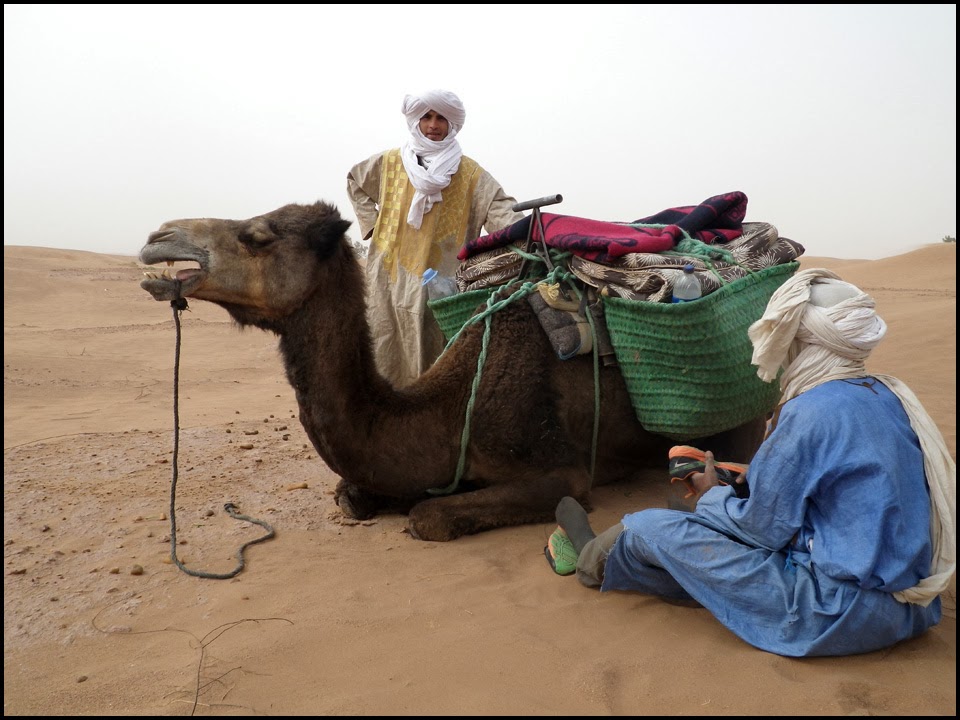 |
| wandering. |
It was not without great effort that I found myself in the
middle of the Sahara desert recently, skirting the Moroccan-Algerian border.
The dunes waved under the sunlight and the clear sky was a pastel shade of
blue.
One of two camel companions on the trek, who we lent the
moniker Jazz, stooped down to pick up the orange peels I tossed on the ground
moments before. Roger, camel number two, sauntered over to join in.
The journey had begun two days before with a hectic 12 hours
in Marrakesh. Arriving late in the evening, we roamed the dizzying back streets
as we located our riad and wandered through the chaos of the Jemaa el Fna, the
town square. The Jemaa, famous for beheadings of the past, was now laden with
drum circles, snake charmers, henna artists and orange juice vendors, all vying
for the attention of potential customers.
 |
| Isa poses as Said fixes his shoes. |
The following 12 hours we journeyed over the Atlas Mountains
by bus, with frequent stops in ramshackle villages in route to M’Hamid – an
arid desert town in the deep south. A half bottle of Dramamine rested in our
stomachs.
As I stared at the dunes, Jeremy walked over and patted Jazz
on the nose. He replied in protest, which made Jeremy laugh.
A few meters away, our two desert guides, Isa and Said, set
up the kitchen tent. They were both nomads of the Berber tribe in their early
20s. They knew the desert well.
“It is our home,” Isa explained.
With camels for transport, living off of the land, with more
than a few carried amenities, was seamless.
Every morning they served up coffee and tea, hard-boiled
eggs, fruits, bread and jam.
 |
| lunch. |
Mint tea was made throughout the day and lunch was more fresh
food than any two persons could ever eat.
Isa, a name that is an Arabic form of Jesus, told us that in
the desert you always make more food than you need because you never know what
other nomads you may encounter. The life in the desert is a life shared.
Isa spoke English relatively well, although he had never
studied it, he said. He learned simply through conversation. He had met many
tourists over the years and it was sense of pride to show them the desert as he
saw it.
Our small caravan walked 20 kilometers a day, with both the
weather and landscape changing rapidly.
Said, whose birth name means “happy” but often went by the nickname
Sawadee, was more reserved and shy. He prayed several times everyday, sang
songs of Allah and greeted us in the morning hours with “allahu akbar,” which
means God is great.
 |
| the dunes. |
He knew a few words in English and although he wore a turban
most of the time, when the cloth fell below is mouth, it revealed an infectious
smile.
As he poured us tea one day, ceremoniously holding the pot a
foot in the air above the cup to create bubbles (used to aerate and filter out both
leaves and sand), in perfect English he said, “Tea without bubbles is like a
nomad without a turban.”
Jeremy and I fell into desert life easily with our new
companions. They shared their lives with us and we wished to do the same.
Isa tossed his shoes after the first day, saying they were
too small and gave him blisters. He was the same size as me, so I gave him my
tennis shoes and put on my Chacos.
He took the gift, nodded and said thank you, and continued
to walk barefoot for the remaining two days.
On our final night together, Isa and Said sang Moroccan
folks songs while beating on empty water containers; I serenaded them with a
Bill Monroe tune. The full moon created a romantic backdrop for our intimate
gathering.
 |
| the wind picked up on the third day. |
Dinner was walloping once again and we explained the
colloquialism “fat and happy,” which Isa reiterated on our final day, adding
more English to his lexicon gained from interactions with tourists.
As we parted, Isa said he hoped he had made us comfortable,
happy and adequately shared life in the desert with us. We assured him he had.
“Good,” he smiled, adding “I wish to make you fat.”
He waved and walked back into the nomadic life he lives
every day. Perhaps one day when Isa is walking, it’ll be in my shoes –I just hope
he’s as comfortable as I was walking in his.
